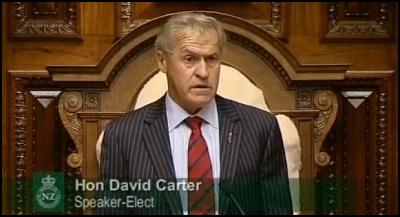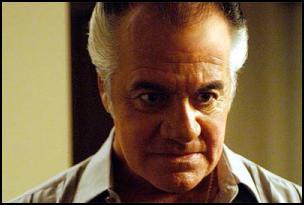Gordon Campbell: NZ secretly agrees to extend copyright term
Gordon Campbell on New Zealand secretly agreeing to extend its copyright term
by Gordon Campbell
So Labour MP Trevor Mallard has got himself in hot water with Speaker of the House David Carter for tweeting that Mr Speaker seemed to have been acting of late like a Mafia Don running a protection racket on behalf of his colleagues. By doing so, Mallard has supposedly brought the independence of the Speaker, the sanctity of parliamentary process etc into public disrepute.
Note however, that this heinous tweet incident occurred on the same day Carter was unable to figure out for himself that calling an MP ‘the Jimmy Savile of New Zealand politics’ was an objectionable slur – until he was told so by his colleague Anne Tolley. Who knows the mind of NZ First leader Winston Peters, and whether he really meant to imply that independent MP Brendan Horan was (a) a child molester or (b) someone who preyed on the vulnerable. Carter’s initial lack of response to the Jimmy Savile jibe can be explained in only two ways. Either Carter didn’t hear it, or he didn’t know what it meant. I’m betting on the latter, which means that a whole new realm of parliamentary insult may have been opened up by the Speaker’s apparent lack of familiarity with the basics of popular culture. Will Question Time become full of insults likening one’s parliamentary opponents to Solange Knowles in an elevator, or Rolf Harris at a children’s party? Question to Finance Minister Bill English: was Player X involved in arriving at the figures for the Budget surplus?
My guess is that Trevor Mallard – who probably wouldn’t mind being called the Joe Pesci of the Labour caucus – wasn’t being literal. His tweet was - big reveal – a metaphor. I don’t think he meant to imply Mr Speaker goes around knee capping centre-left MPs in Question Time to keep the government’s waste disposal contracts safe and sound. Partiality? Parliament lets the winning coalition pick the Speaker from among its own ranks, but then expects the public to retain a simple faith in the impartiality of the referee. C’mon, that’s always been a bit of credibility stretch. It is also a situation that could easily be fixed – if the House was so inclined – by making the Speaker’s role entirely apolitical, as it is in Britain.
Yet maybe this case has a simple explanation. Maybe Trevor Mallard has been watching too much television, and had been kicking back with the old Sopranos box sets. Maybe he was merely wondering whether anyone else on the Twitterverse has ever seen David Carter and Paulie Walnuts in the same room, at the same time.


Click for big versions.
Has New Zealand caved in during the Trans Pacific Partnership and agreed to extend our term of copyright to 70 years? The attempt to keep the TPP on life support appears to have culminated in New Zealand negotiators agreeing to extend our current 50 year term of copyright, in line with the desires of Hollywood corporates to push out their profit horizons. Here’s what the Japanese newspaper Yomiuri Shimbun was reporting a week ago:
Japan, the United States and 10 other countries participating in the Trans-Pacific Partnership talks are likely to agree on uniformly setting the copyright protection period for music and written works, such as novels, at 70 years, according to Japanese and U.S. sources involved.
Concerning the data protection period for medical inventions, during which a firm that developed a new medicine has the right to monopolize the market, the length seems likely to be set at about 10 years for developed countries and five years or less out for emerging countries.
So, without any public consultation on the matter, we seem to have gone along with the TPP consensus to extend copyright by 20 years – no doubt, to the delight of John Key’s friends at Warners and other Hollywood studios – as part of an IP deal that involves extending the patents for new medicines in developed countries, and recognising shorter patent terms in poorer countries. Yomiuri Shimbun goes on in very convincing detail:
Among the 12 [TPP] countries, Japan, Canada and four other countries [including New Zealand] protect an author’s copyright for 50 years after their death, the United States and four other countries for 70 years and Mexico for 100 years. Following the agreement, Japan will extend its duration by 20 years. The United States wants the TPP standard to be the same as its own 70-year period, with the aim of earning profits for many more years by exporting films and music.
Japan has strategically withheld final judgment on the issue as it was at odds with the United States over tariff issues. But the country eventually accepted the 70-year protection period after the two countries reached substantial agreements on tariffs in April. Regarding films, Japan has set a 70-year protection period after their release. Therefore, there will be no major change concerning DVD sales, broadcasting or distributions of classic films.
Malaysia, Vietnam and other emerging countries were initially against the standardization of the 70-year protection period due to the resulting rise in copyright fee payments. But their position weakened after the United States and Japan, the two leading countries in the negotiations, were working more in harmony. They were also prompted to compromise, as the United States had made its own concessions in the data protection period for new medicines.
The participating countries reached a working-level agreement to flexibly deal with the data protection period issues by factoring the economic growth level of each country into consideration. For emerging countries concerned that it may become difficult to acquire inexpensive generic medicines, the protection periods will be shorter than those for developed countries. The concrete figures for each nation are expected to be decided at the ministerial meeting.
There was however a distinct lack of public transparency about those “concrete figures for each nation” - or about any other matter - in the communiqué that emerged from the May 19-20 TPP ministerial in Singapore, which consisted only of this volley of clichés:
In a series of positive meetings we cemented our shared views on what is needed to bring negotiations to a close. We focused in particular on making meaningful progress on market access and also advanced outstanding rules issues in an effort to narrow our remaining differences. In order to further build on the momentum of negotiations, we have decided on a pathway for intensified engagement over the coming weeks on market access and rules. As part of that effort, which will take place bilaterally and in other configurations, we have instructed our Chief Negotiators to meet in July. At the same time, Ministers will continue to engage bilaterally to direct negotiations, coordinate, and tackle the most challenging outstanding issues. We will also continue our respective processes of domestic consultations…. Zzzzzzzz
Regardless, we now seem to have a concrete concession in the TPP talks that the mainstream media in Japan, at least, is treating as a fait accompli. It would be helpful to have political confirmation here on this point. Have we agreed to extend our term of copyright for the benefit of US entertainment industry heavyweights – which will inhibit creativity by our own artists and designers – or not? And have we also accepted the related IP deal whereby drug patents for new medicines are set at longer periods in developed countries and at a shorter term in poorer countries – and would this concession amount to a savings or an additional cost to Pharmac? What calculations on those “concrete figures” have been done, and on their likely budgetary impact? In the meantime and to the Japanese at least, July now appears to be the “make or break” meeting for the TPP.
Labour Swans Song
No
truth to rumours that Michael Gira has been asked to write a
campaign song for the Labour Party, but reputedly, this
Swans classic would pretty much capture the mood of the
Labour caucus at present.
ENDS


 Gordon Campbell: On Budget 2025
Gordon Campbell: On Budget 2025 Keith Rankin: Using Cuba 1962 To Explain Trump's Brinkmanship
Keith Rankin: Using Cuba 1962 To Explain Trump's Brinkmanship Binoy Kampmark: The Killing Of Israeli Embassy Staffers - Netanyahu’s Antisemitism Canard
Binoy Kampmark: The Killing Of Israeli Embassy Staffers - Netanyahu’s Antisemitism Canard Keith Rankin: Zero-Sum Fiscal Narratives
Keith Rankin: Zero-Sum Fiscal Narratives Eugene Doyle: Chinese Jet Shoots Down France’s Best Fighter; NZ And Australia Should Pay Attention
Eugene Doyle: Chinese Jet Shoots Down France’s Best Fighter; NZ And Australia Should Pay Attention Ian Powell: “I Can Confirm They Are Hypotheticals Drawn Largely From Anecdotes And Issues The Minister Has Heard About.”
Ian Powell: “I Can Confirm They Are Hypotheticals Drawn Largely From Anecdotes And Issues The Minister Has Heard About.”